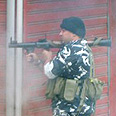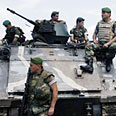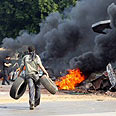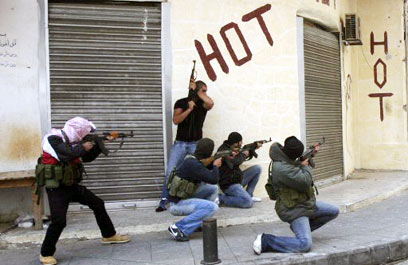


Lebanese security and hospital officials said that at least 12 gunmen died and 20 wounded in a gun battle between pro- and anti-government groups in a remote region of northern Lebanon.
Saturday's battle occurred in the town of Halba in Akkar, a remote Sunni region in northernmost Lebanon when fighters loyal to Sunni leader Saad Hariri and the government clashed with members of the Syrian Social Nationalist Party, a secular pro-Syrian group allied with the Shiite Hizbullah.
The pro-government fighters stormed the office of the SSNP and set it ablaze after the gun battle.
The number raises to 37 the death toll since Shiite-Sunni sectarian erupted in Beirut on Wednesday and spread to other regions.
Earlier, Lebanese security officials say that five more people have been killed outside the capital of Beirut.
Shiite movement Hizbullah tightened its control of the Lebanese capital on Saturday in a show of force after it routed gunmen loyal to the Western-backed government.
Four of those killed were opposition backers who clashed with supporters of anti-Syrian Druze leader Walid Jumblatt in the mountain town of Aley, east of Beirut late Friday night.
Another civilian died in the clashes in the southern city of Sidon.
The United States, which considers Hizbullah a terrorist group, a threat to Israel, and a weapon in the hands of Iran in Lebanon, said it was talking with other powers about taking measures against "those responsible for the violence".
On the streets of Beirut, fighters from the Iranian- and Syrian-backed group continued to man checkpoints on main thoroughfares, although in smaller numbers than a day earlier. Traffic was thin as many residents chose not to go to work and Beirut's international airport remained closed.

Hizbullah gunmen in Beirut (Photo: Reuters)
A few shops reopened after the army deployed in several areas but did not interfere with Hizbullah guerrillas, who in turn stayed away from main government installations in Beirut.
Hizbullah took control of the Muslim west Beirut on Friday in what the government and its allies described as "an armed and bloody coup".
The United States criticized Hizbullah's links to Damascus and Tehran. A US State Department spokesman said Hizbullah's actions were illegal.
Christian districts in east Beirut have been spared the fighting after Hizbullah defeated forces loyal to parliamentary majority leader Saad al-Hariri. Hariri's supporters still controlled areas in the north of the country and kept a key crossing point with Syria in the Bekaa Valley shut.
Hariri is a son of the late Prime Ministrer Rafik al-Hariri, whose assassination three years ago began the worst turmoil in Lebanon since the 1975-1990 civil war, which split Beirut into eastern Christian and western Muslim parts.
High stakes
Saudi Arabia and Egypt, which back Lebanon's government, called for an Arab foreign ministers meeting as early as Sunday.
"The meeting is an important step because Arab states have to assume responsibility regarding the situation in Lebanon. There are regional repercussions at stake and the situation must be saved," Arab League chief Amr Moussa told al-Jazeera television.
The fighting erupted after the government said it was taking legal action against Hezbollah's military communications network on grounds it was illegal. Hizbullah said the government had declared war.
Sounding a conciliatory note, Druze leader Walid Jumblatt, a key figure in the ruling coalition, said the government was only inquiring about Hizbullah's communication network, the main issue that ignited the latest crisis.
"Dialogue is the only way out," Jumblatt said, adding that the crisis was unlikely to deteriorate unless Hezbollah chooses to "Liquidate" The pro-Western government.
The anti-Syria ruling coalition said the "armed and bloody coup" was aimed at increasing Iran's influence and restoring that of Syria, forced to withdraw troops from Lebanon in 2005 following Hariri's assassination.
Syria said the issue was an internal Lebanese affair while Iran blamed "the adventurist interferences" of the United States and Israel for the violence.
The crisis has paralyzed political decisions, left Lebanon without a president and shaken the image it rebuilt as the business and entertainment centre of the Middle East in the aftermath of its civil war, although the sectarian political system that contributed to the war has remained mostly intact.
Reuters and The Associated Press contibuted to this report















